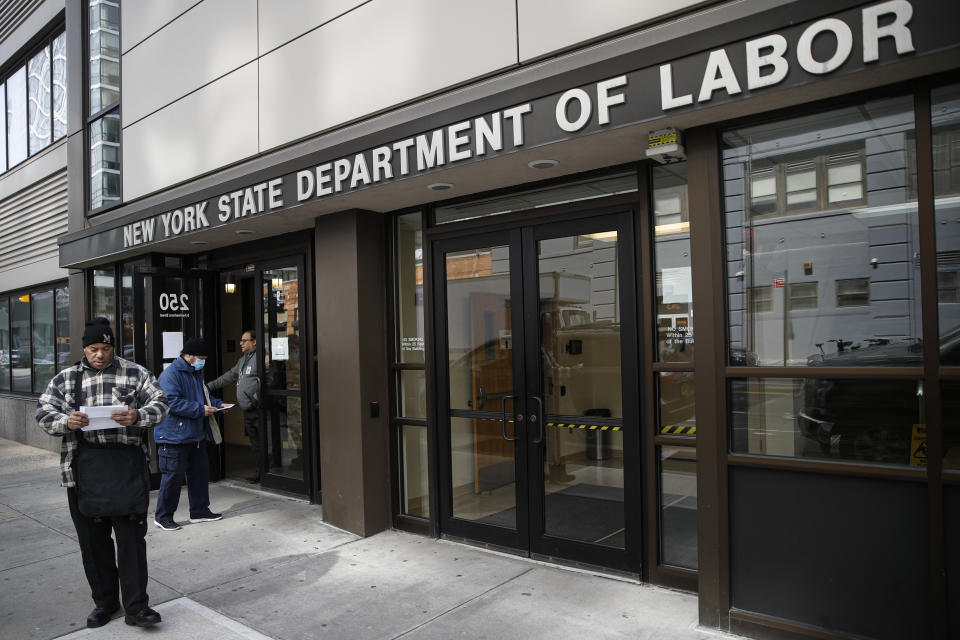‘I'm looking at everything:’ Recent college graduates struggle to find jobs
Twenty-one-year-old Sarah Tilton just graduated from Capital University in Ohio and is entering a job market she wasn’t ready for.
While at college she worked as an office assistant, but now she’s unemployed and struggling to find a job. Without income, she was forced to move back home, facing mounting payments and costs to repair her car.
She’s still looking for a job, but the responses have significantly diminished since the pandemic unfolded.
Read more: Coronavirus: How to find a job in a tough economy
“In January, I'd get around four or five interviews back, now I don't even get one,” she said. “A part of me is happy that I'm done with college, then there's another part of me that wishes I would have stayed another year because I probably would be better off.”
Tilton isn’t the only one. In this tough job market, 2 in 3 three recent graduates worry they won’t be able to find a job in their related study, a survey of 1,000 College Finance shared exclusively with Yahoo Money found.

“Recent graduates starting their careers in the midst of a global pandemic will face undeniable obstacles in terms of finding a new internship or job,” said Amanda Stansell, Glassdoor senior economic research analyst. “The current crisis is certainly unprecedented due to its unique impact on the economy, combining the scale of a recession at the pace of a natural disaster.”
Applicants with ‘maybe 10 years more experience than you’
Tilton is looking for business management and administrative office positions, but she’s competing against some of the 36 million Americans who have filed unemployment insurance claims in the last two months.
“It’s been hard to put yourself out there and show what your abilities are when you have applicants who lost a job and have maybe 10 years more experience than you do,” Tilton said.
Read more: Workers rights: Here's how the new coronavirus legislation protects you
Along with the millions of job losses across the U.S., openings for new positions also have shrunk. Job postings on Indeed were down 39% through May 8 compared with the same period in 2019.
“I've had three or four [companies] so far finally turn me down at the last minute because of higher-qualified candidates,” Tilton said. “It's kind of a competitive aspect that's usually always around, but it's around a lot more during the time that we're in.”

It’s not just entry-level jobs getting more competitive; internships are, too, according to Valerie Sutton, director of career services at the Harvard Graduate School of Education.
Half of U.S. internship openings closed since the pandemic started, and hiring for internships was down 39% in April versus 2019, according to recent data by Glassdoor.
Among those whose internships were canceled, “they're recognizing that it's much more competitive versus the student that was just now starting to search for an internship,” Sutton said.
‘Save enough to pay my bills’
Tilton continues to apply for jobs related to her field of study, but she’s also open to jobs that can “put money in my pocket that I need for right now,” she said.
“Right now I'm looking at everything. That way I can save enough to pay my bills,” Tilton said. “And then when the full U.S. opens up and this is put behind us, I can finally look for something long term.”
Others in Tilton’s position are taking the opposite approach. Two in 5 new graduates paused their job search because of the economic impacts of the pandemic, according to College Finance’s survey.
But taking a job outside your field of study may help your future prospects, Sutton said, so don’t dismiss them as valueless.
“If you can't get into an industry sector or role that interests you, look at what transferable skills you can get,” she said.
Stansell also noted that the rise of remote work could mean that grads eventually have the unique opportunity to work for companies they never considered otherwise.
“Many new grads will need to broaden their horizons on the types of jobs they apply for that still use the skills they have now to help them get to where they want to be career-wise,” she said. “It’s key to remember that a career trajectory is not usually a straight line.”
Denitsa is a writer for Yahoo Finance and Cashay, a new personal finance website. Follow her on Twitter @denitsa_tsekova.
Read more:
Coronavirus: What American workers should know about their rights as the economy reopens
Coronavirus stimulus checks: Americans vent frustrations about problems receiving the money
Read more personal finance information, news, and tips on Cashay
Follow Yahoo Finance on Twitter, Facebook, Instagram, Flipboard, SmartNews, LinkedIn, YouTube, and Reddit.

 money
money 

